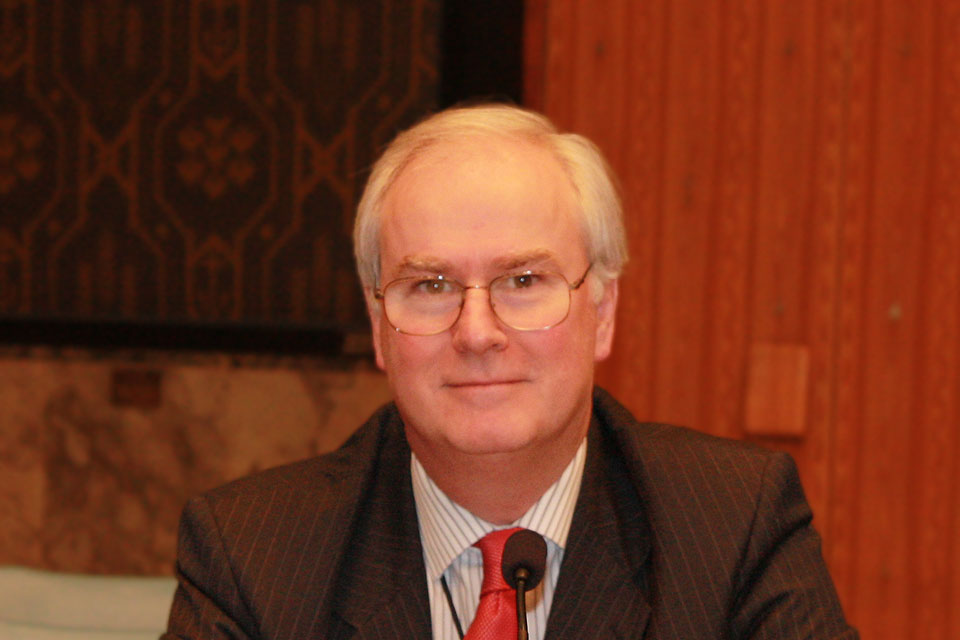"Murder of journalists is an attack on democracy"
Statement by Ambassador Mark Lyall Grant, Permanent Representative of the UK Mission to the UN, to the Security Council Open Debate on Protection of Journalists

Thank you, Madam President for holding this important debate today. And I would like to also warmly thank the Deputy Secretary-General for his valuable briefing, and the representatives of the media, Mr Engel, Ms Carroll, Mr Abdinur, and Mr Abdul-Ahah, for sharing their moving experience and powerful insights with the Security Council this morning.
Madam President,
Journalists help to shape our understanding of the world by providing accurate, impartial reports of what is happening around us. This is particularly important in conflict areas where access to information is challenging and often inconsistent. Journalists often place themselves in dangerous situations in order to reveal the facts. They go where most of us are unable to go in order to report and to reveal. They seek out and bear witness to human rights violations and the violation of international laws. That is why journalists should have the freedom to report the news without fear of reprisal or being targeted.
Unfortunately journalists, human rights defenders, and NGOs promoting freedom of expression continue to be specifically targeted across the world. Last year was one of the bloodiest years on record for journalists’ deaths: 121 were killed and over 200 were imprisoned. 18 of those killings were in Somalia alone.
And not much has changed this year. Many of you will recall the murder of journalist Liban Abdullahi Farah only a few weeks ago. Liban worked for London-based channel, Kalsa TV. He filed a series of reports on the election campaigns in Puntland in Somalia. Liban was shot six times in the neck and chest by three gunmen. His murder demonstrates that exposing injustice and abuse often takes journalists to unsafe places where they are at greater risk of random violence as well as intentional targeting. In Syria, 8 journalists have been killed this year alone and at least 39 have been killed since the conflict began. Case after case of journalists’ killings around the globe underscore that murder is the most brutal form of censorship. It is our moral duty to protect those who risk their lives in the name of truth, justice and human rights.
Madam President,
The United Kingdom is deeply committed to the Protection of Civilians in situations of conflict, including the protection of journalists and fully supports UN Security Council resolution 1738. Deliberate targeting of journalists, media professionals and associated personnel who are reporting on armed conflicts and are not directly participating in hostilities is unacceptable. All parties to an armed conflict must comply fully with their obligations under international law related to the protection of civilians, including journalists, media professionals and associated personnel. As the Council reaffirmed in February’s presidential statement, journalists should not be differentiated from civilians and should be respected and protected as such under international humanitarian law.
International journalists can and do try to mitigate the risks of working in conflict zones, as we’ve heard. Civil society plays an important role in assisting journalists in this regard. For example, the Committee to Protect Journalists has published a ‘Journalist Security Guide’ which suggests ways journalists can protect themselves while covering armed conflict, organized crime, and corruption, including guidance on security training, protective gear and satellite technology. Columbia University here in New York supported valuable research on the psychological trauma journalists may face from their work and measures to address it.
But despite heightened awareness, killings are on the rise. Danger is compounded by the failure of states to prosecute those who kill journalists. This culture of impunity, which all the journalists have spoken about today, must end. In countries where justice for these crimes is left unaddressed, there is clear evidence that systematic violence against the press recurs year after year. States must do more, not only to protect journalists but to bring to justice those who kill them. Media outlets should also do more to develop and sustain safety provisions for their staff.
Madam President,
The international community must also do its part. Journalists provide an invaluable service to the United Nations, in particular the Security Council, by reporting on situations that threaten peace and security. The United Nations has produced the Plan of Action on the Safety of Journalists and the Issue of Impunity. The United Kingdom fully supports this plan. It will help states develop legislation and mechanisms to allow for freedom of expression and support efforts to implement existing international rules and principles. And we encourage all Member States to work together with the United Nations to implement its provisions.
It is a sad irony that deaths of journalists and support staff are themselves under-represented by the media. The vast majority of journalists killed are local reporters whose murders go almost entirely unnoticed. They simply become statistics. This group often has no access to the protection and guidance offered by large media or civil society organizations. They are the most at risk and the most in need of support. And as we have heard most are not killed in armed conflict. Only about one in four are killed in a war zone. The great majority are killed in their own countries during times of peace covering serious public interest issues such as corruption and crime. This is deplorable. The murder of journalists is an attack on democracy and the goal of promoting free speech.
Madam President,
In every part of the world, during times of peace and conflict, journalists broadcast the people’s voice. This Council must recognise and support that goal. We must continue to take steps to protect journalists and enable them to report – for their reporting is one crucial element in the difficult path towards peace.
Thank you.